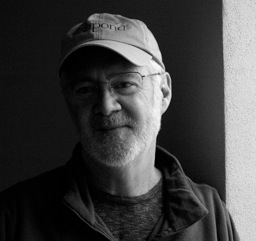Voices of the Middle West presents: Jack Driscoll
In the lead-up to Voices of the Middle West on March 22, 2014, we’ll be presenting short interviews with the acclaimed panelists on our Author Panel.
**
 Jack Driscoll is the author of four novels, four poetry collections, and the AWP Short Fiction Award winner Wanting Only to Be Heard. He has also received the Barnes & Noble Discover Great New Writers Award, the PEN/Nelson Algren Fiction Award, the Pushcart Editors’ Book Award, Pushcart Prizes, PEN Syndicated Fiction Awards, and Best American Short Story citations. He currently teaches in Pacific University’s acclaimed low-residency MFA program in Oregon.
Jack Driscoll is the author of four novels, four poetry collections, and the AWP Short Fiction Award winner Wanting Only to Be Heard. He has also received the Barnes & Noble Discover Great New Writers Award, the PEN/Nelson Algren Fiction Award, the Pushcart Editors’ Book Award, Pushcart Prizes, PEN Syndicated Fiction Awards, and Best American Short Story citations. He currently teaches in Pacific University’s acclaimed low-residency MFA program in Oregon.
Midwestern Gothic: What’s your connection to the Midwest?
Jack Driscoll: I’m not originally from the Midwest. I’m a New Englander, born and raised, a Massachusetts boy, a transplant, and native therefore to nothing in the hinterlands where I now reside. I’d hitchhiked through the Midwest on my way to that other ‘dream coast’ and back in the late 1960s, but previous to my arrival in northern Michigan I had never once conceived of such a place as a destination. And so when I accepted a job at Interlochen Center for the Arts to teach in, and help design a creative writing major, I thought it a stopover, a year, maybe two, before I found my way back home. That was in 1975—I was still in my twenties—and I can now say, with the perspective of time and distance, that putting down here was the single most important thing that’s ever happened for me. It’s where I live and write, and exactly where I want to be.
MG: How important/significant do you feel the Midwest identity is?
JD: I don’t necessarily think of myself that way, as a Midwestern writer, but rather as an American writer who happens to live in northern Michigan, and whose work is informed by this particular place/landscape. To say it another way, if I attempted to set the stories elsewhere, they’d cease to be. Landscape is not merely a backdrop against which the action plays out, but rather what shapes character and behavior. As Ortega y Gasset says, “Tell me the landscape in which you live and I will tell you who you are.”
Not to mention an implicit tension created by what the place provides and what it can’t possibly deliver. That tension between where we ‘reside’ and what we ‘desire,’ and to which the anagram speaks and makes abundantly apparent.
MG: How do you feel the Midwestern voice is different from other cultures?
JD: First of all, I doubt that it’s singular. And that this very large territory is no more homogenous in its representative voices than is—say—Manhattan. And that a Midwestern voice can only ever refer to a synthesis, multifariously inflected. Not ‘a voice’ but lots of different voices. Just as the Midwest is made up of a lot different places.
And if I’m thinking correctly, it follows that place is bound to govern diction—language specific to that locale—plus an inventory of ‘things’ particular to that place, as well as a range of plausible actions proper to the setting in which the narrative occurs.
MG: How does the Midwestern voice come to life in your work?
JD: In my recent collection The World Of A Few Minutes Ago, nine of the ten stories are set in northern Michigan. The one that isn’t takes place in Maine, where I used to teach and where I’ve spent considerable time. But the characters are on vacation there, non-residents, visitors, the insider-outsider story, because I felt I knew that place only well enough to use it in this capacity.
Jim Harrison refers to what the locals call summer: “three months of bad sledding.” Or the standing joke: There are only three seasons in northern Michigan, July, August, and winter. Already we’re up to over 200 inches of snow this winter, and I love such extremes, and what it does to the psyche, and how, for example, if you’re susceptible to boredom—the most fatiguing of all human enterprises—you might just concoct a way to get yourself in trouble, and that’s what makes for story.
MG: What was the last thing you read, and how was it?
JD: Just yesterday I finished a story collection by Ron Rash called Chemistry. I didn’t finish it in a single sitting, but almost. It’s first-rate, and I recommend it highly.






